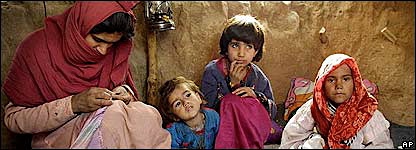Traditional American-style aid inhibits progress in Afghanistan
More than five years after the defeat of the
Taleban in Afghanistan, the failure of international aid to make a difference to
Afghanistan is now having serious security consequences.

More than five years after the defeat of the Taleban
in Afghanistan, the failure of international aid to make a
difference to Afghanistan is now having serious security
consequences.
The amount of money promised per head for Afghanistan was far lower than in other recent post-conflict countries, and too little of it has gone into increasing the capacity of the Afghan government to run things for itself.
Most Americans don’t realize that virtually all “foreign aid” funds must be spent in the United States with U.S. firms. Welfare plans aside, the policy means that money doesn’t get into the hands of ordinary citizens in the client nation.
In a report more than a year ago, the World Bank warned of the dangers of an ‘aid juggernaut’, a parallel world operating outside the government economy, with Afghans not even able to bid for major infrastructure contracts, such as roads.
Some small rural schemes - drainage, clinics, small power projects and schools are now being built through the National Solidarity Programme. That is a fund managed and distributed through the Afghan government, with almost all of the money coming from international donors.
Building up the institutions of the state is after all a central part of fighting insurgencies, according to the new counter-insurgency manual being used by US forces - the first written since the end of the Vietnam War.
The manual even emphasises that the new state does not have to do things especially well: “The host nation doing something tolerably is normally better than us (the United States) doing it well.”
But the doctrine has not yet worked through to changing the culture of how to spend aid money, either through USAid, or the Pentagon which runs its own aid programme.
Detailed, well-researched article - worth a reflective read. Originally, I was reviewing articles spinning from the UN report describing continued expansion in the opium trade. This one - at least - tries to examine more of the cause-and-effect relationships affecting the whole country.
The amount of money promised per head for Afghanistan was far lower than in other recent post-conflict countries, and too little of it has gone into increasing the capacity of the Afghan government to run things for itself.
Most Americans don’t realize that virtually all “foreign aid” funds must be spent in the United States with U.S. firms. Welfare plans aside, the policy means that money doesn’t get into the hands of ordinary citizens in the client nation.
In a report more than a year ago, the World Bank warned of the dangers of an ‘aid juggernaut’, a parallel world operating outside the government economy, with Afghans not even able to bid for major infrastructure contracts, such as roads.
Some small rural schemes - drainage, clinics, small power projects and schools are now being built through the National Solidarity Programme. That is a fund managed and distributed through the Afghan government, with almost all of the money coming from international donors.
Building up the institutions of the state is after all a central part of fighting insurgencies, according to the new counter-insurgency manual being used by US forces - the first written since the end of the Vietnam War.
The manual even emphasises that the new state does not have to do things especially well: “The host nation doing something tolerably is normally better than us (the United States) doing it well.”
But the doctrine has not yet worked through to changing the culture of how to spend aid money, either through USAid, or the Pentagon which runs its own aid programme.
Detailed, well-researched article - worth a reflective read. Originally, I was reviewing articles spinning from the UN report describing continued expansion in the opium trade. This one - at least - tries to examine more of the cause-and-effect relationships affecting the whole country.
Posted: Tue - June 26, 2007 at 09:08 AM